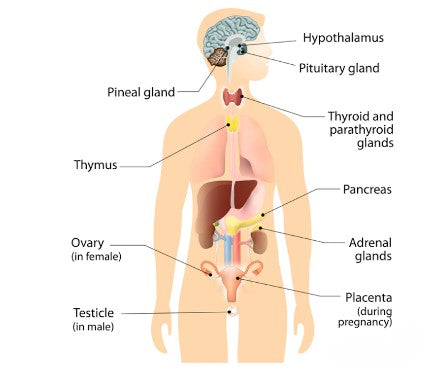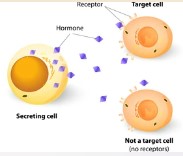Understanding the Endocrine System: Your Body's Chemical Messengers
You already know about the nervous system, which helps transmit information throughout your body. Well, the endocrine system works hand in hand with the nervous system to regulate various processes in your body.
Instead of using nerves, the endocrine system employs a network of glands that produce and release special chemical messengers called hormones. These hormones travel through your bloodstream to target specific sites in your body, where they have important effects.
Let's explore this system further and unravel its secrets.

Endocrine Glands: Masters of Hormones
Imagine glands as tiny factories located throughout your body, responsible for manufacturing and secreting hormones. The major players in the endocrine system include the pituitary gland, adrenal glands, and the reproductive organs (ovaries and testes). Each gland produces different hormones, which are like messengers that tell organs and tissues what to do. It's almost like an intricate orchestra, with each gland playing its unique tune to keep your body in harmony.
Regulating the Endocrine System: The Feedback Mechanism
Just like a thermostat regulates the temperature in a room, your endocrine system relies on feedback to maintain balance.
Here's how it works: The hypothalamus, a region of your brain, sends a signal to the pituitary gland using a releasing hormone. This triggers the pituitary gland to release a stimulating hormone into your bloodstream. This hormone then signals the target gland, like the adrenal glands, to release its hormone. As the hormone levels rise, the hypothalamus and pituitary gland sense it and reduce their own secretions, leading to stable hormone concentrations in your bloodstream.
Hormones: Messengers with Specific Targets
Hormones are remarkable chemicals that travel through your bloodstream, reaching target sites throughout your body. While they come into contact with most cells, they usually affect only specific cells known as target cells. Target cells have receptors that bind to a particular hormone, allowing it to have a direct influence. Think of it as a lock and key mechanism. When enough receptors are stimulated by hormones, your body responds with physiological reactions. Timing and appropriate hormone levels are crucial for proper functioning. Too much or too little at the wrong time can cause disruptions in your bodily systems.
The Mighty Pituitary Gland: The Master Controller
Among the endocrine glands, the pituitary gland holds the title of the "master gland." It produces hormones that travel through your bloodstream, influencing other glands and regulating various bodily functions. The hypothalamus, situated just above the pituitary gland, controls its activities. By receiving information from different sources about your body's basic functions, the hypothalamus helps regulate and maintain these functions. One way it accomplishes this is by controlling the pituitary gland.
Hormones Produced by the Pituitary Gland: A Symphony of Effects
The pituitary gland has two parts: the anterior (front) pituitary and the posterior (back) pituitary. These two parts release different hormones, each with its specific target. The anterior pituitary produces hormones like ACTH, which responds to stress and stimulates the adrenal glands to release cortisol. It also produces luteinising hormone (LH) and follicle-stimulating hormone (FSH), crucial for reproductive functioning and sexual characteristics. On the other hand, the posterior pituitary releases oxytocin, involved in childbirth and mother-infant bonding.

Adrenal Glands: The Stress Managers
Nestled on top of your kidneys, the adrenal glands are your stress managers. They consist of two distinct parts: the outer adrenal cortex and the inner adrenal medulla. These parts have different functions, with hormones from the cortex being essential for life. The adrenal cortex produces cortisol, which regulates vital bodily functions like cardiovascular health and inflammation. It also releases aldosterone, responsible for maintaining blood volume and pressure. Meanwhile, the adrenal medulla releases adrenaline and noradrenaline, hormones that prepare your body for fight or flight responses.
Ovaries: The Powerhouses of Female Reproduction
Ladies, let's talk about your ovaries! They play a vital role in your reproductive system. Your ovaries produce eggs and hormones like estrogen and progesterone. Progesterone, especially during the post-ovulation phase of your menstrual cycle, influences your sensitivity to social cues, aiding in the identification of opportunities or threats related to pregnancy.
Testes: The Builders of Masculinity
Guys, it's your turn! The testes, the male reproductive glands, are responsible for the hormone testosterone. Testosterone is a key player in developing male characteristics like facial hair, deepening of the voice, and the growth spurt during puberty. It also affects sex drive, sperm production, muscle strength, and overall well-being. The hypothalamus and pituitary gland control testosterone production, ensuring the right levels for optimal health. It's worth noting that women also have testosterone, but in smaller amounts.
Conclusion: Your Body's Marvellous Chemical Symphony
Congratulations on completing this journey through the endocrine system! You've discovered how glands and hormones work together to regulate various functions in your body. The endocrine system and nervous system form an incredible partnership, ensuring your body functions smoothly. Now, it's time to put your knowledge to the test!
Take the quiz below to challenge yourself and solidify your understanding of the endocrine system. Good luck!
